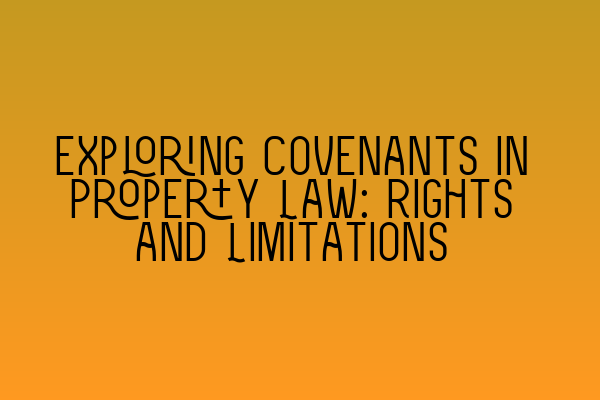Exploring Covenants in Property Law: Rights and Limitations
Welcome to our blog post on covenants in property law! As a solicitor specializing in property law at SQE Property Law & Land Law, I’m excited to delve into this important topic with you today. Covenants play a crucial role in regulating and protecting rights and limitations associated with property ownership. Whether you’re a property owner, a prospective buyer, or simply interested in understanding the intricacies of property law, this article will provide you with a comprehensive overview of covenants.
What are Covenants in Property Law?
Covenants are legally binding agreements that impose obligations or restrictions on the use or ownership of a property. These agreements are typically included in property deeds and are designed to govern certain aspects of the property. Covenants can be created by agreement between parties or could be imposed by law or a previous owner. They serve to protect the rights and interests of both the property owner and the broader community.
Types of Covenants
There are two main types of covenants in property law: positive covenants and restrictive covenants.
1. Positive Covenants: Positive covenants require the property owner to actively do something. For example, a positive covenant may restrict the property owner from using the property for commercial purposes or may require the property owner to maintain certain shared facilities, such as roads or gardens. Positive covenants are often associated with residential developments or planned communities.
2. Restrictive Covenants: Restrictive covenants, on the other hand, impose limitations on the property owner’s rights. These limitations may restrict the use, development, or alteration of the property. For instance, a restrictive covenant may prevent the property owner from erecting additional structures or carrying out certain activities on the property.
Rights and Limitations
Covenants serve to protect the interests of various stakeholders, including property owners, neighboring property owners, and the surrounding community. By establishing rights and limitations, covenants help maintain harmony and protect property values. Let’s explore some of the key rights and limitations associated with covenants:
1. Protecting Property Values: Many covenants are put in place to maintain property values within a particular area. These covenants may restrict the type of construction or alteration allowed on a property, ensuring that the overall aesthetic and character of the neighborhood are preserved. By upholding these restrictions, property owners can have greater confidence in the value and appeal of their investments.
2. Preserving Shared Amenities: Positive covenants often require property owners to contribute towards the maintenance and upkeep of shared amenities, such as communal gardens or recreational facilities. These covenants ensure that everyone within a development or community bears their fair share of the responsibility, creating a more harmonious living environment.
3. Balancing Interests: Covenants can also be used to strike a balance between competing interests. For example, a restrictive covenant may prohibit the excessive use of land for commercial purposes to protect the privacy and tranquility of neighboring residential properties. By imposing limitations on the property owner’s rights, covenants can prevent potential conflicts and maintain the overall quality of life in an area.
Enforcement of Covenants
Enforcing covenants can sometimes be a complex and contentious process. If a property owner breaches a covenant, the affected party may have legal recourse to seek enforcement or compensation. The specific procedures for enforcement will depend on various factors, including the type of covenant, the jurisdiction, and any applicable legal frameworks.
It is advisable to seek professional legal advice if you are involved in a covenant dispute or require clarification on the rights and limitations associated with a particular covenant.
Stay Informed with SQE Property Law & Land Law
To delve deeper into property law, we offer a range of SQE preparation courses and exam dates that can help you sharpen your knowledge and be prepared for your legal career. Explore our SQE 1 Practice Exam Questionsand SQE 1 Practice Mocks FLK1 FLK2 articles to enhance your understanding and boost your exam preparation.
At SQE Property Law & Land Law, we are committed to keeping you informed about the latest developments in property law and providing expert guidance. Stay tuned for more informative blog posts, specifically tailored to help you navigate the intricate world of property law.
Remember, understanding covenants and their rights and limitations is essential for any property owner or aspiring legal professional. By familiarizing yourself with these concepts, you can ensure a smooth and harmonious experience in property ownership and transactions.
Disclaimer: This article is provided for informational purposes only and does not constitute legal advice. For specific legal guidance, please consult a qualified solicitor.
